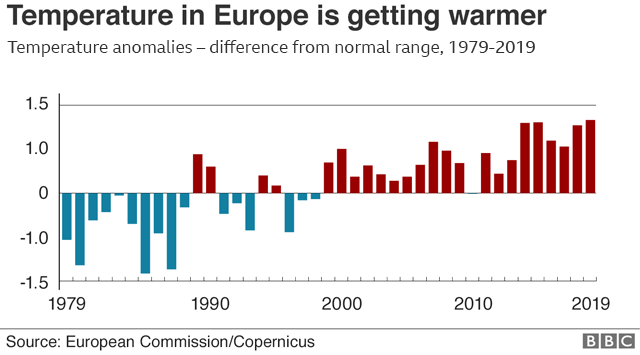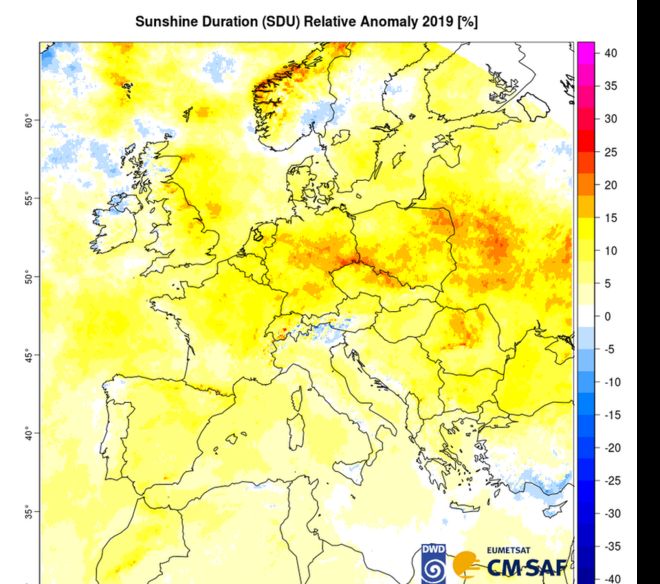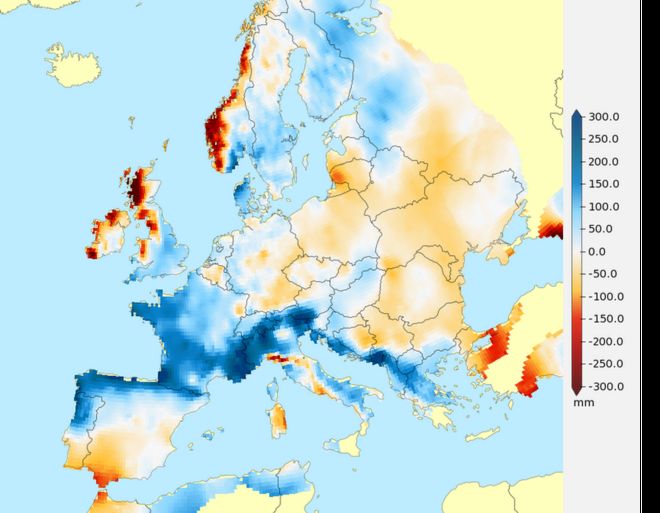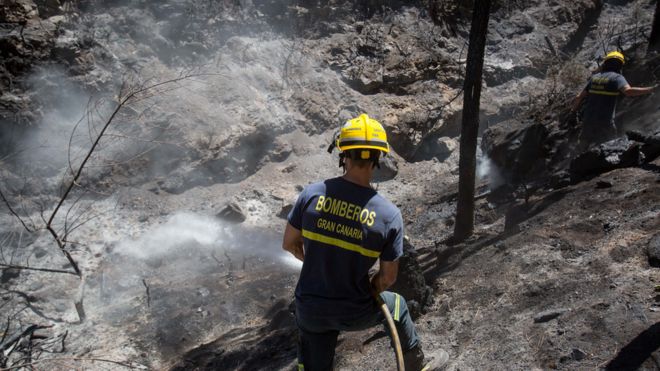Climate change: 2019 was Europe's warmest year on record
By Matt McGrathEnvironment correspondent
 Image copyrightGETTY IMAGESImage captionThree heatwaves hit Europe across 2019
Image copyrightGETTY IMAGESImage captionThree heatwaves hit Europe across 2019
Europe is heating faster than the global average as new data indicates that last year was the warmest on record.
While globally the year was the second warmest, a series of heatwaves helped push the region to a new high mark.
Over the past five years, global temperatures were, on average, just over 1C warmer than at the end of the 19th century.
In Europe, in the same period, temperatures were almost 2C warmer.
The World Meteorological Organization (WMO) says the physical signs of climate change and impacts on our planet have gathered pace in the past five years, which were the hottest on record.
The European data, which comes from the EU's Copernicus Climate Service, 11 of the 12 warmest years on record on the continent have occurred since 2000.

The European State of the Climate 2019 shows that warm conditions and summer heatwaves saw drought in many parts of central Europe.
While the UK saw a new all-time high temperature recorded in Cambridge in July, in many places across the continent, the weather was 3-4C warmer than normal.
This is reflected in the amount of sunshine that hit Europe across the year. The number of sunshine hours was the largest on record.
 Image copyrightC3S/ECMWFImage caption2019 was a record year for sunshine hours
Image copyrightC3S/ECMWFImage caption2019 was a record year for sunshine hours
The hot summer weather across Europe was followed by one of the wettest Novembers on record, with rainfall almost four times the normal amount in western and southern Europe.
The European Arctic region though was below the high temperatures seen in recent years, just 0.9C higher than average.
Taken together, the data show "a clear warming trend across the last four decades."
"Europe has indeed been warming significantly faster than the global average," said Prof Rowan Sutton, director of science (climate) at the UK's National Centre for Atmospheric Science.
 Image copyrightC3S/ECMWFImage captionEurope was also hit by heavy rainfall during the later part of last year
Image copyrightC3S/ECMWFImage captionEurope was also hit by heavy rainfall during the later part of last year
"This is for two reasons. First, land regions in general are warming faster than the oceans, largely because the greater availability of moisture over the oceans damps the rate of warming."
"Secondly, reductions in specific forms of air pollution have contributed to the recent warming in Europe, particularly in summer."
What will worry researchers is that the mean temperature in Europe over the past five years is averaging almost 2C warmer than pre-industrial figures.
This suggests that the continent is breaching the promise made in the Paris climate agreement to keep temperatures "well below" 2C.
"In lockdown, sitting on our sofas or our makeshift desks or in many more difficult situations, it would be easy for us to take our eyes off this alarming reality; that 2019 was the warmest year on record for Europe, that November brought us massively more precipitation than normal," said Prof Hannah Cloke, from the University of Reading.
"And for every decade I have been on this planet, it has been getting hotter and hotter and hotter. "
Researchers in the field are keen to underline that while the coronavirus pandemic might mean a temporary drop in emissions of greenhouse gases, much more will need to be done to arrest the worrying warming trend.
"While pollution has dropped with economic activity in response to the global pandemic, CO2 is not just disappearing overnight," said Prof Daniela Schmidt, from the University of Bristol.
 Image copyrightGETTY IMAGESImage captionFires made worse by drought were a feature in many European countries in 2019
Image copyrightGETTY IMAGESImage captionFires made worse by drought were a feature in many European countries in 2019
"The impact of the warming like sea level rise will be with us for centuries. The pandemic has made us less able to tackle the impact of climate change impacts. Our communities which have just been flooded will find sheltering in their damaged homes much more challenging.
"We have also learned, though, during the last months that actions taken together to make a difference."
The new data has been published by the Copernicus Climate Change Service, which is implemented by the European Centre for Medium-Range Weather Forecasts.
Commenting on the Earth Day anniversary, the WMO's secretary general, Petteri Taalas, said it was important to continue tackling climate change amid the global pandemic.
"Whilst COVID-19 has caused a severe international health and economic crisis, failure to tackle climate change may threaten human well-being, ecosystems and economies for centuries," he said.
"We need to flatten both the pandemic and climate change curves."
Echoing earlier comments by the UN secretary general Antonio Guterres, Mr Taalas commented: "We need to show the same determination and unity against climate change as against COVID-19. We need to act together in the interests of the health and welfare of humanity not just for the coming weeks and months, but for many generations ahead."
By Matt McGrathEnvironment correspondent
- 6 hours ago
- 271comments
- Share this with Facebook
- Share this with Messenger
- Share this with Twitter
- Share this with Email
- Share

Europe is heating faster than the global average as new data indicates that last year was the warmest on record.
While globally the year was the second warmest, a series of heatwaves helped push the region to a new high mark.
Over the past five years, global temperatures were, on average, just over 1C warmer than at the end of the 19th century.
In Europe, in the same period, temperatures were almost 2C warmer.
- July was 'marginally' world's warmest month ever
- Hundreds of temperature records broken over summer
- Last decade 'on course' to be warmest
The World Meteorological Organization (WMO) says the physical signs of climate change and impacts on our planet have gathered pace in the past five years, which were the hottest on record.
The European data, which comes from the EU's Copernicus Climate Service, 11 of the 12 warmest years on record on the continent have occurred since 2000.

The European State of the Climate 2019 shows that warm conditions and summer heatwaves saw drought in many parts of central Europe.
While the UK saw a new all-time high temperature recorded in Cambridge in July, in many places across the continent, the weather was 3-4C warmer than normal.
This is reflected in the amount of sunshine that hit Europe across the year. The number of sunshine hours was the largest on record.

The hot summer weather across Europe was followed by one of the wettest Novembers on record, with rainfall almost four times the normal amount in western and southern Europe.
The European Arctic region though was below the high temperatures seen in recent years, just 0.9C higher than average.
Taken together, the data show "a clear warming trend across the last four decades."
"Europe has indeed been warming significantly faster than the global average," said Prof Rowan Sutton, director of science (climate) at the UK's National Centre for Atmospheric Science.

"This is for two reasons. First, land regions in general are warming faster than the oceans, largely because the greater availability of moisture over the oceans damps the rate of warming."
"Secondly, reductions in specific forms of air pollution have contributed to the recent warming in Europe, particularly in summer."
What will worry researchers is that the mean temperature in Europe over the past five years is averaging almost 2C warmer than pre-industrial figures.
This suggests that the continent is breaching the promise made in the Paris climate agreement to keep temperatures "well below" 2C.
"In lockdown, sitting on our sofas or our makeshift desks or in many more difficult situations, it would be easy for us to take our eyes off this alarming reality; that 2019 was the warmest year on record for Europe, that November brought us massively more precipitation than normal," said Prof Hannah Cloke, from the University of Reading.
"And for every decade I have been on this planet, it has been getting hotter and hotter and hotter. "
Researchers in the field are keen to underline that while the coronavirus pandemic might mean a temporary drop in emissions of greenhouse gases, much more will need to be done to arrest the worrying warming trend.
"While pollution has dropped with economic activity in response to the global pandemic, CO2 is not just disappearing overnight," said Prof Daniela Schmidt, from the University of Bristol.

"The impact of the warming like sea level rise will be with us for centuries. The pandemic has made us less able to tackle the impact of climate change impacts. Our communities which have just been flooded will find sheltering in their damaged homes much more challenging.
"We have also learned, though, during the last months that actions taken together to make a difference."
The new data has been published by the Copernicus Climate Change Service, which is implemented by the European Centre for Medium-Range Weather Forecasts.
Commenting on the Earth Day anniversary, the WMO's secretary general, Petteri Taalas, said it was important to continue tackling climate change amid the global pandemic.
"Whilst COVID-19 has caused a severe international health and economic crisis, failure to tackle climate change may threaten human well-being, ecosystems and economies for centuries," he said.
"We need to flatten both the pandemic and climate change curves."
Echoing earlier comments by the UN secretary general Antonio Guterres, Mr Taalas commented: "We need to show the same determination and unity against climate change as against COVID-19. We need to act together in the interests of the health and welfare of humanity not just for the coming weeks and months, but for many generations ahead."

